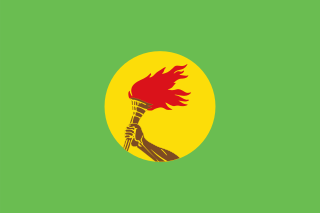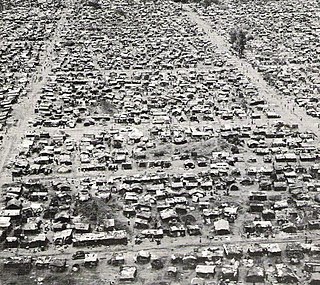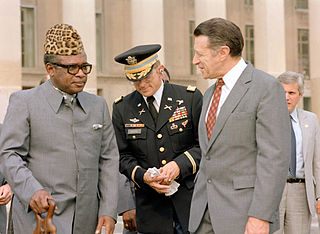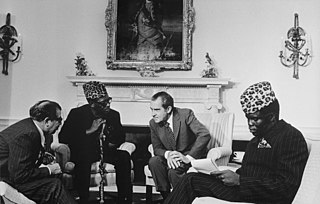| |||||
| Decades: | |||||
|---|---|---|---|---|---|
| See also: | History of Zaire | ||||
The following lists events that happened during 1972 in Zaire .
| |||||
| Decades: | |||||
|---|---|---|---|---|---|
| See also: | History of Zaire | ||||
The following lists events that happened during 1972 in Zaire .
| Date | event |
|---|---|
| 2 January | President Mobutu Sese Seko announced his new campaign, "Authenticité", to remove all traces of the former Belgian Congo's colonial past in favor of "Africanized" names, customs and dress. Having changed his own name from Joseph-Desire Mobutu to Mobutu Sese Seko Kuku Ngbendu wa za Banga, the President required citizens with European-sounding names to change them to something more authentic African names. [1] |
| 22 August | Diocese of Baudouinville renamed as Roman Catholic Diocese of Kalemie–Kirungu |

Zaire, officially the Republic of Zaire, was the name of the Democratic Republic of the Congo from 1971 to 1997. Located in Central Africa, it was, by area, the third-largest country in Africa after Sudan and Algeria, and the 11th-largest country in the world from 1965 to 1997. With a population of over 23 million, Zaire was the most populous Francophone country in Africa. Zaire played a central role during the Cold War.

Mobutu Sese Seko Kuku Ngbendu wa za Banga, often shortened to Mobutu Sese Seko or Mobutu and also known by his initials MSS, was a Congolese politician and military officer who was the 1st and only President of Zaire from 1971 to 1997. Previously, Mobutu served as the 2nd President of the Democratic Republic of the Congo from 1965 to 1971. He also served as the 5th Chairman of the Organisation of African Unity from 1967 to 1968. During the Congo Crisis, Mobutu, serving as Chief of Staff of the Army and supported by Belgium and the United States, deposed the democratically elected government of left-wing nationalist Patrice Lumumba in 1960. Mobutu installed a government that arranged for Lumumba's execution in 1961, and continued to lead the country's armed forces until he took power directly in a second coup in 1965.

The national flag of the Democratic Republic of the Congo is a sky blue flag, adorned with a yellow star in the upper left canton and cut diagonally by a red stripe with a yellow fimbriation. It was adopted on 18 February 2006. A new constitution, ratified in December 2005 and which came into effect in February 2006, promoted a return to a flag similar to that flown between 1966 and 1971, with a change from a royal blue to sky blue background. Blue represents peace. Red stands for "the blood of the country's martyrs", yellow the country's wealth; and the star symbol the future for the country. It is one of the few national flags incorporating a diagonal line, with other examples including Tanzania, Namibia, Trinidad and Tobago, Saint Kitts and Nevis, and Brunei.

The Congo Crisis was a period of political upheaval and conflict between 1960 and 1965 in the Republic of the Congo. The crisis began almost immediately after the Congo became independent from Belgium and ended, unofficially, with the entire country under the rule of Joseph-Désiré Mobutu. Constituting a series of civil wars, the Congo Crisis was also a proxy conflict in the Cold War, in which the Soviet Union and the United States supported opposing factions. Around 100,000 people are believed to have been killed during the crisis.

The First Congo War, also nicknamed Africa's First World War, was a civil war and international military conflict which lasted from 24 October 1996 to 16 May 1997 and took place mostly in Zaire, with major spillovers into Sudan and Uganda. The conflict culminated in a foreign invasion that replaced Zairean president Mobutu Sese Seko with the rebel leader Laurent-Désiré Kabila. Kabila's unstable government subsequently came into conflict with his allies, setting the stage for the Second Congo War in 1998–2003.

Catholicism has a major presence in the Democratic Republic of the Congo (DRC). It is part of the worldwide Catholic Church under the spiritual leadership of the Pope in Rome.

The abacost, a blending of the French "à bas le costume", was the distinctive clothing for men that was promoted by Mobutu Sese Seko as part of his authenticité programme in Zaire, between 1972 and 1990. Zairians were banned from wearing Western-style suits with shirt and tie to symbolise the break with their colonial past. The abacost was a lightweight suit, worn without a tie, though sometimes with a cravat. It closely resembled a Mao suit. It was seen in long-sleeved and short-sleeved versions.

Jean Nguza Karl-i-Bond was a prominent Zairian politician.

The Prime Minister of the Democratic Republic of the Congo is the head of government of the Democratic Republic of the Congo. The Constitution of the Third Republic grants the Prime Minister a significant amount of power.

Mobutu Sese Seko's foreign policy emphasized his alliance with the United States and the Western world while supposedly maintaining a non-aligned position in international affairs. Mobutu ruled the Republic of the Congo and then Zaire as president for 32 years, from 1965 to 1997.

The Republic of the Congo was a sovereign state in Central Africa, created with the independence of the Belgian Congo in 1960. From 1960 to 1966, the country was also known as Congo-Léopoldville to distinguish it from its northwestern neighbor, which is also called the Republic of the Congo, alternatively known as "Congo-Brazzaville". In 1964, the state's official name was changed to the Democratic Republic of the Congo, but the two countries continued to be distinguished by their capitals; with the renaming of Léopoldville as Kinshasa in 1966, it became also known as Congo-Kinshasa. After Joseph Désiré Mobutu, commander-in-chief of the national army, seized control of the government in 1965, the Democratic Republic of the Congo became the Republic of Zaire in 1971. It would again become the Democratic Republic of the Congo in 1997. The period between 1960 and 1964 is referred to as the First Congolese Republic.

Corruption in the Democratic Republic of the Congo, which used to be an institutionalized part of the state, has been relatively lowered in recent years. However, it continues to exceed corruption in comparison to most states. The BBC's DRC country profile calls its recent history "one of civil war and corruption." President Joseph Kabila established the Commission of Repression of Economic Crimes upon his ascension to power in 2001.
The Congo, short for the Democratic Republic of the Congo, is an equatorial country located in central Africa. As of July 2018, the CIA World Factbook lists the Congo containing over 85 million inhabitants representing over 200 African ethnic groups. French is the country's official language, and Catholics comprise the largest religious group at fifty percent. The Congo was colonized by King Leopold II of Belgium in 1885, and known as Belgian Congo until it gained independence. Both the Soviet Union and United States had kept a close watch on the mineral-rich country until on June 30, 1960, the Congo finally gained independence under the democratically elected Prime Minister Patrice Lumumba. Lumumba was a charismatic nationalist who led the only party in parliament with a nationwide base, rather than a regional or ethnic base.

Democratic Republic of the Congo–Russia relations are the bilateral foreign relations between the Democratic Republic of the Congo and Russia. The Democratic Republic of the Congo has an embassy in Moscow and an honorary consulate in Yekaterinburg. Russia has an embassy in Kinshasa. The relations between the two countries were established on July 7, 1960, and restored since November 30, 1967.

Presidential elections were held in the Democratic Republic of the Congo on 1 November 1970. The only candidate was Joseph Mobutu, who had taken power in a military coup five years earlier. The elections took the format of a "yes" or "no" vote for Mobutu's candidacy. According to official figures, Mobutu was confirmed in office with near-unanimous support, with only 157 "no" votes out of over 10.1 million total votes cast. Mobutu also received around 30,000 more "yes" votes than the number of registered voters, even though voting was not compulsory.

Congolese nationalism in the Democratic Republic of the Congo was also for a time known as Zairian nationalism during the rule of Mobutu Sese Seko. Congolese nationalism persists among the people of the Democratic Republic of the Congo, in spite of civil war and the lack of a clear definition of what it means to be Congolese.
This is a list of Chiefs of Staff of the armed forces of the Democratic Republic of the Congo and Zaire.
Louis de Gonzague Bobozo was a Congolese military officer who served as commander-in-chief of the Congolese National Army from 1965 until 1972.
In the Democratic Republic of the Congo, it is common for individuals to possess three separate names: a first name (prénom) and surname (nom) as well as a post-surname (postnom). Each form may comprise one or more elements. For example: